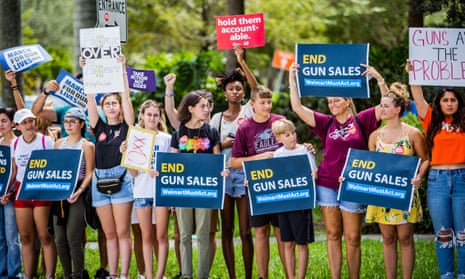March for Our Lives, the organization created by survivors of the February 2018 mass school shooting at Marjory Stoneman Douglas high school in Parkland, Florida, released an audacious policy agenda calling for far-reaching reform.
The proposal released on Wednesday, Peace Plan for a Safer America, includes plans to reduce the number of firearms in civilian hands by 30%, create a mandatory federal gun buyback program for assault weapons, and re-examine the Heller decision – the 2008 supreme court ruling allowing private citizens to keep handguns in their homes.
“The next president must act with a fierce urgency to call this crisis what it is: a national public health emergency,” the plan reads.
“The time for comprehensive and sweeping reform is now.”
The plan comes as the 2020 presidential election cycle heats up, and amid renewed attention on gun control following mass shootings in Gilroy, California; El Paso, Texas; and Dayton, Ohio.
Following the shootings, Donald Trump appeared to cautiously support calls for background checks for gun sales, even as the president focused much of his response to the shootings on blaming mental illness. On Tuesday, however, Trump walked back his support for the gun control measures, after a meeting with officials from the National Rifle Association.
Groups like March for Our Lives argue that the new measures are long overdue. Democrats have long supported what some call commonsense gun laws that include banning assault weapons and mandating universal background checks. But emboldened by broad support for gun control among the American public, and young voters in particular, the activists hope that Democrats will back more ambitious measures, including mandatory assault weapon buybacks and an IRS investigation of the NRA.
“This plan is not geared toward Democrats or Republicans. It’s not about a party, it’s not about politics, it’s about saving lives and prioritizing that,” said Eve Levenson, federal programs manager at March for Our Lives.
“We’re looking to change the culture of gun violence and that is going to require doing some things that are going to make people at first think, ‘Oh no you’re going to take my guns’,” Levenson continued. “It’s not about what we’re against, it’s what we’re for,” she added.
“The simplest comparison to make is the right to drive a car. We should have that same level of standard of expectancy to own a gun,” Levenson said.
March for Our Lives’ suggested policies would put the US in step with countries such as New Zealand, where officials passed sweeping legislation banning assault weapons six days after 51 people died in the mass shooting at a mosque in Christchurch.
The March for Our Lives platform also includes strategies to prevent the maelstrom of daily gun violence that receives less attention than mass shootings, including community gun violence, suicide and domestic abuse.
“What works in one community to reduce gun violence may not work in another,” the plan notes.
The March for Our Lives plan is unambiguously bold. Some gun law experts worry that focusing on radical goals, including re-examining the supreme court’s Heller ruling, may hurt broader gun regulation reforms.
Adam Winkler, a constitutional law professor and gun rights scholar at the University of California, Los Angeles, says the calls to repeal the Heller decision could lead to a political backlash that would make any action by the supreme court on issues such as assault weapons and a ban on high-capacity magazines unlikely.
Amid such a backlash, Winkler argued, “the court may strengthen protections for gun owners to carry their guns in public, protect new weapons, and expand the rights from inside the home to outside the home, affecting the standard of review.
“Overturning Heller does not fundamentally shift the status of American gun rights,” Winkler said.
